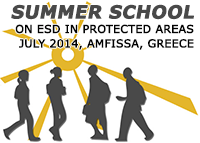|
|||||
| |
|
Home Partners Designated areas & BRs The course Trainers Presentations Students' Essays - TOOLKIT - Recommendations for Nagoya Participants Agenda Report Students' Info Practical Info The host venue Funds Contact us |
Download the recommendations:
|
The summer school has resulted in the following list of recommendations, in view of the UNESCO Conference to mark the end of the UN Decade on ESD (10-12 November 2014, Nagoya Japan). The post graduate students of the Summer School on Education for Sustainable Development (ESD) in Protected Areas and MAB Biosphere Reserves, 6-19 July 2014, having been informed about:
we would like to share our experience and submit some recommendations to be considered by the aforementioned Conferences. Our experience: The Summer School in Amfissa, Greece was a multidisciplinary, multicultural practice that allowed us to critically compare and analyse our approaches towards sustainability and ESD. This led to a broadening of knowledge and enrichment of our views on the issues underlining ESD. The experience gained and the observations of the natural processes in the ecosystem of Mt Parnassus has helped us understand the importance and the dynamics of sustainable development as well as the interconnections between local communities, their social and economic needs and their environment. From our field activities we became aware of the importance of responsible water management and the significance of a specialised education focusing on it. Effective water management cannot be achieved without the participation of well educated and critically thinking citizens. Overall we consider this experience as a useful tool through raise the awareness of future participants. We recommend that this practice continues increases and expands this type of activity. Our recommendations:
Amfissa, 29 July 2014 The ERASMUS Intensive Program (IP) on Education for Sustainable Development (ESD) in Protected Areas and MAB Biosphere Reserves was organised by the University of Athens, in Amfissa, Greece, between 6 and 19 July 2014 with the participation of 8 Universities and other stakeholders from the Euro-Mediterranean region. The 2 week Summer School, provided an intensive training on how ESD can be applied in various types of designated areas to thirty nine (39) trainees, a blend of post-graduate students and junior professionals of Biosphere Reserves from 11 countries. |
Under the auspicies of the hellenic National Comission for UNESCO |
||






